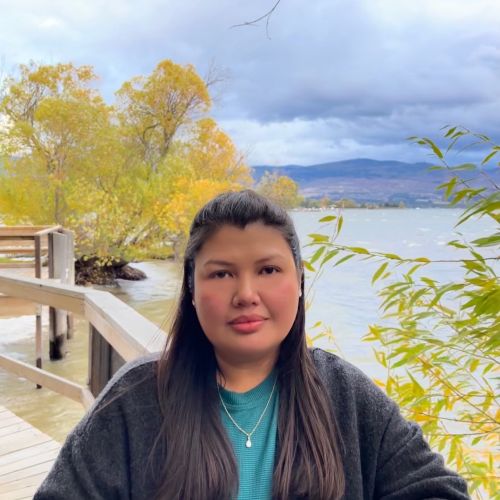
- Country: Philippines
- Poems: '113 Submerged Reefs', '”An Emotional Issue”', ‘A Boat Across the River’
Rina Garcia Chua
Bio
Rina Garcia Chua (she/siya) is a creative and critical scholar from the Philippines who is currently based in British Columbia, Canada. Her poems and short stories have been previously published in many journals, such as World Literature Today, Asteri(x), g u e s t, and The Goose: Journal of Arts, Culture, and Environment in Canada (which she is currently co-editor of). Rina is completing her poetry chapbook, “A Geography of (Un)Natural Hazards,” which is a visual and poetic response to migrant and arrivant cultures, liminal environments, and violences of form and language.
What are the ecological / social crises within your region / country?
I live in the liminal—one half of me in Manila, where I was born, and one half of me in British Columbia, where I currently am situated at. Growing up in Metro Manila, I experienced some of the most frightening ecological and social crisis of our times, such as the eruption of Mount Pinatubo and the endless barrage of floods that snarled the city (such as Typhoon Ondoy/Ketsana which forced me to swim and walk in flooded highways when it dumped a month’s worth of rain in just a few hours). I was also born at the end of the Martial Law era, during the exhilaration of the EDSA Revolution. I carry these histories in my body, and I’ve flown with them across the Pacific Ocean when I chose to study and live in Canada. My poems are attentive to geographies, the counternarratives within them, and the contrasts of two worlds that are an ocean apart—I often think about how I am not afraid of floods where I live in BC’s interior region, but I am kept awake at night by wildfires and the smell of smoke in the air. I’ve learned to drive in blizzards and to make my brown body fit into spaces that viscerally do not welcome me. Today, I am worried about my heartland. The dictatorship that was toppled at the cusp of my birth has begun to choke my nation once more—a cyclical pattern of fascism fueled by online misinformation channels that are also flourishing in many spaces. Every day, I am worried about my fifteen-year-old daughter who is forced to assimilate in a country that is being challenged by extremist ideologies of far-right groups. I am worried about the wildfires, every summer, and then the longer and colder bouts of winter every year. Yet, I accept this privilege of my body being split by an ocean and to have one finger each on the pulse of my two countries. From this, I create new countries, unknown spaces, in my own art and writing. I have found solace in the liminal, for it means I get to live without boundaries.